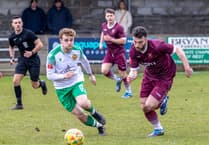Ian Nockolds: Well, I’m delighted to welcome to the Toolstation Western League podcast for the first time Simon Wilkinson, the chairman of Radstock Town. Simon, thank you very much for taking the time to speak to us. We’re going to have a chat about what’s going on at the club as I know you’ve been very, very busy during the lockdown period that we’ve had over the last twelve months. Could you tell the listeners some of the improvements you’ve made up at Southfields?
Simon Wilkinson: To start with, the skittle alley has been totally gutted and refurbished, still not quite finished, there is a little bit of snagging to do still, you know, skirting boards, pelmets that type of thing still needs going up. We spent a lot of money on steels to have the roof supported, I think it’s that strong you can probably build another two levels on top if you wanted to! But a lot of money spent on that, so it’s all been totally redecorated, new plasterboard, plastered, ceiling plastered, new window put in, new floor. The guys have worked their socks off for want of a better word.
IN: And it’s the players, isn’t it, who’ve been helping you out.
SW: Some players, yeah, a couple of first teamers, James Rustell supplied the flooring at cost and fitted it with Simon Millard. The likes of Nathan Townsley, Charlie Cook from the reserves has done the majority of the plastering, Pete Ruprich ’Spread it and Lay it’ is what they’re called. And he’s done a lot of the plastering as well. Decorating, new floor in the bar, all sorts of things Ian, you walk into the place twelve months ago and then walk into it now you wouldn’t recognise it, it’s totally different. I’m really, really pleased with what the guys have done.
IN: And the work’s not just been going on inside the clubhouse has it? At a time when we’re all very much focussed on reopening outside hospitality, I know that’s something you’ve been working on as well.
SW: We’ve got a patio area outside the back of the skittle alley, which is nearing completion. I believe there’s some benches being delivered tomorrow, heavy duty picnic benches, six, I think. The beauty of it is the south-facing wall and it just looks all the way over the waterside valley, it’s fantastic.
IN: Now, of course, we normally talk about your first team, your Western League side when we talk about Radstock on the podcast, but I just wanted to give the listeners a feel for what other teams have you got up operating underneath your first team?
SW: We have Radstock Town reserves and they play in the Somerset County League Division Two. We have Ian Lanning’s under-18’s that play in the Wiltshire Premier under-18’s division. And we also have the veterans side. I think they play in the Somerset Legends league and they play on a Sunday morning. We did have a team playing in the Mid-Somerset, but that sort of moved lock, stock and barrel to Haydon about a year and a half, two years ago.
IN: One of the reasons I wanted to ask you about this is because the FA recently launched a grassroots strategy, and I think it’s interesting for us to look at that from a Western League perspective, because in terms of your first team, of course, you’re playing Step Six, and we know that that’s part of the National League system. But, you know, you’ve still got plenty of people playing at the club, and in the age groups that are a priority for the FA, like the under-18’s, like the veterans. You’ve still got a lot of other sides that are playing in what the FA would term as grassroots football.
SW: Yes, we do. Yeah, we’ve got, like I said, Baz’s reserves, they play in the county league. It’s not just a matter of turning players out to play. There’s a lot that goes on behind the scenes, I mean, Baz and Russ Beveridge, the amount of work they have to do to get that side out. Also, you’ve got Rich Sobers, he’s more to do with the first team now to be totally honest, but he’s had a lot to do with all sides at the club for quite a number of years now. And the people that work behind the scenes just to get a team out, let alone three or four, it’s unbelievable, there’s so many things you have to think about, and it’s just hard work at times.
IN: So, I mean, as the Chairman of the club, do you regard yourselves as a National League system club or are you a grassroots football club?
SW: I would regard ourselves as between the two. When I have an idea of what I believe to be grassroots football, and not wanting to be too controversial, more leaning towards grassroots than National League, yes.
IN: Do you think, then, if we look at some of the challenges that the FA want to address. They’re talking about retaining male players, given what you said about your A-Team that’s something that you can relate to, and they want to increase access for girls and women’s football. And they also talk about the quality of facilities and pitches in particular, and talking about volunteers as well. So I mean, all of those things, I guess, are things that we can relate to, and we can agree with, but I mean, the practical reality for a football club is; now where do you see the big challenges lie? What are your big problems?
SW: There’s problems everywhere, isn’t there? I mean, to start with, keeping a decent surface for all teams to play on, changing rooms, changing facilities, they have to be top notch, or clean and safe to use, especially with what’s going on with COVID at the moment. Player recruitment, players get older, don’t they? So, as the years go on, you have to have people coming in behind. Yeah, we’ve got the under-18’s that can supply certain players, not all, because what you’ve got to remember is they’re very young and some of our under-18’s operate at the age of fifteen. I’m not sure what the cut-off date is, but you have to be fifteen to play under-18’s football, you can’t play any earlier than that. So yeah, I think the biggest thing is just keeping a steady flow of players going through a club, so that you can actually fill 3, 4, 5, 6 sides some clubs have, some maybe more than that.
IN: And that’s a question of not necessarily what you know, but who you know, isn’t it? It’s about having the right people in running your teams and people who’ve got good connections and a good reputation in the community.
SW: You have to rely on your managers to know what they’re doing, yeah. They have to know - I mean, Rich Baron has been around the club for many, many years. He knows lots and lots of people, and people come to him, players come to him, young players, ’I want to step up from the under-18’s, is there any chance I can have a game with the reserves?’ ’Yeah, you seem half decent, come along, we’ll give you a chance.’ And it’s been proven through the first team as well to be honest, you know, some of the under-18’s that have come up through and are now some of our better players, like young Morgan Skipp he’s probably - I’m not sure how old he is now, but he’s got to be 20-21. Rico Sobers, the likes of that, they’ve all come up through the system from under-18’s, Jack Scrivens, the goalkeeper, a decent keeper. Yeah, there’s ever so many of them, you know, without naming everybody, I could go on forever. I hope I’ve not upset anybody by not mentioning them!
IN: Well, let’s talk about, obviously, if we’re going to watch a game of football, you need footballers to be turning out and I get that that’s important. But also you need people behind the scenes on a match day, whether it’s a match day for your first team or a match day for your reserves or the under-18’s, you need people there making sure that the pitch is maintained, that the kit’s out. I mean, I’ve seen you up at Southfields, you’ve taken my money at the gate, you’ve served me a drink behind the bar, and you’re the club chairman. So I mean, you must be acutely aware of how important volunteers are and actually how difficult they are to find.
SW: Yeah, we’re quite lucky at the moment, I suppose, at Radstock. The only thing where we do suffer is your manpower is split on a Saturday when you have two or three games on at the same time, because you probably find in most clubs, that all your volunteers in running the club, are involved with other teams further down the pecking order, maybe not quite right words to say "pecking order", but like Baz and Russ, and those who run the reserves, they can’t normally be about at the same time as a first team’s playing, because they have to take their reserves off, and do all the bits and pieces that they need to do for the reserves. So, that leaves less manpower at a home game. We’re lucky enough we’ve got Mike Jenkins, who hopefully as a rule does the gate but I tend to go over and help him as well. We don’t suffer so much now with bar staff, we’ve got some loyal bar staff, who run the bar for us, so I tend to find myself on the correct side of the bar nowadays. But yeah, you’re right, I have done in the past, taken money on the gate, served behind the bar, collected up all the kit, which I still do now. Prepare the pitch, mark the pitch, cut the pitch and basically look after the pitch, all sorts of different things like that. There isn’t, generally, too many of us about on a home match day, unless there’s nothing else on.
IN: Your situation isn’t exactly unique to the Western League is it? I think particularly in the First Division it will be a small group of volunteers who will be running a match day having multiple jobs, like you’ve said, and also the other clubs that have a situation where they have an under-18’s side, a reserve side and a first team, there’ll be an idea of progression between those sides for them. The administrative niceties of how we refer to National League football and grassroots football and Step Six, and Step Seven, whilst they work at an administrative level, the reality is that volunteers like you across the length and breadth of the Western League, are juggling multiple balls and all facing the same challenges.
SW: Absolutely. It’s not just the Western League, it’s across the whole country, isn’t it? With possibly rare exceptions of clubs who maybe don’t have that issue, they’ve got maybe more volunteers, but I think you’ll find in general, they’re all run roughly the same way as what we are when you’ve got multiple teams. Obviously, your resources are stretched on a match day, especially if there’s more than one game going on.
IN: How old is Radstock Town football club?
SW: 1895.
IN: So, you’d be celebrating -
SW: 125 years last year.
IN: You’re celebrating 125 years, in a year that didn’t happen. So, maybe that makes you 124! But the serious point is that actually, you’re the custodians of a club that’s been going over 125 years. So actually, that didn’t happen by accident, we should never take these clubs for granted should we?
SW: Absolutely not. I mean, I’m not going to be the first Chairman that has had all these issues. Since 1895, I should imagine it’s been the same, ’oh what are we going to do Saturday, so and so’s doing this, or so and so’s not here.’ Like I said just now, you just have to get on and do it and you make do with what the resources are that you have. There’s nothing else you can do, unless you get more volunteers in, I could do with a kitman, if anybody’s interested.
IN: Have you found a sort of magic bullet for developing new volunteers?
SW: Pint of lager every now and again might help I suppose? No, not really, every now and again, you’ll get somebody come along saying, ’hey, listen, I want to help out, what can I do?’ And that’s absolutely fantastic. But I really, really, really need a kitman!
IN: There’s the come and get me plea. Now, grassroots football came back on March the 29th. Have you been able to have any training or any football up at Southfields?
SW: Yeah, Ryan’s had the first team out training twice now and they were out last night. Baz has had the reserves, last Saturday they trained, I believe they’re training again this Saturday. Ian Lanning’s under-18’s have also trained a couple of times and had a friendly. I believe the reserves, when did they start? The Somerset County league are running a competition as like a subsidiary cup competition just to see the season through, because as you know, all the leagues have been curtailed, apart from the under-18’s that are resuming where they left off. So, I think football starts in earnest again, within the next week, the first team have got a friendly on the 17th of April, other things in the pipeline which no doubt you’ll get to hear about sooner rather than later.
IN: When we look at the guidance that you’ve received so far from the FA, how do you feel, as the Chairman who is ultimately responsible, how do you feel about getting football back underway at the moment?
SW: We definitely need supporters in to make it viable. I can have them round the back of the club drinking on the patio, but I can’t have them round the front of the club drinking while there is a game of football going on. Doesn’t make sense to me. Also, I fail to see how you can allow people to go into a shop and fight over the melons and the potatoes and push each other here, there and everywhere, yet, you can’t let people stand around a football pitch two yards between them watching the football. It just doesn’t make sense.
IN: So, looking ahead then to the new season, it feels like it’s going to be a long way away without football until July’s friendlies, I’m assuming. But I guess it will come around quite quickly - what are your feelings about the prospects of the new season starting?
SW: I’ve been looking forward to it since January. You knew didn’t you, really, as soon as it all stopped at the end of December nothing else is going to happen. And in my opinion, the government, the DCMS, and the FA just delayed everything and delayed everything, when everybody in the world knew what was going to happen. So, why not just come out straight away and say, ’look, we’re not starting football because we’re not coming out of lockdown until then. Just curtail it now and get on with what you need to do, and we’ll start again next season.’ I have my ideas about how it should have restarted and what we should have done, as I’ve obviously spoken to you about, which I think were quite sensible. Unfortunately, I fear that the people that run the game -
IN: That’s an important point to make, isn’t it? Because we all hope we’re out of the woods. We all hope we are. But the reality, if the last twelve months has taught us anything, is you can’t take anything for granted. So, is there anything that you would like to see the FA put in place, bearing in mind the responsibilities that you will have to get games on? I mean, you got ten games on before and it counted for nothing at the end of the day. So, if we’re going to go down this road, again, if we’re going to go out of our way to make sacrifices and to put measures in place, what’s the quid pro quo? What do you want to see the FA put in place to make sure that we don’t suffer this again?
SW: I would like to see when we start the next season, if it has to stop for whatever reason, say it stops for three months, which it has just done, pick up where you left off, carry on, stop when it gets to the summer, if that’s how close you are to the summer, restart again the next season, finish that season off, and then you’re all ready to reload, hopefully, all nice and fresh and ready to go again for the following season. So yeah, you’re gonna have breaks in football. I mean, we’ve all been saying about a winter break for God knows how long anyway, like I was saying just now, yeah, we only played ten games in this season. But I think what we should have done, as I’ve said to you before, is restarted the season, with the games that you were supposed to have played from that date stopped, and then reconvened the following August, with maybe 28 games rather than 38 games to play. And then, okay, that’s one league finished, but it’s taken a season and a half, nearly two seasons to complete. But you’re not any further back, and you’re not any further forward then, you’re just where you should be. Does that make sense?
IN: Yeah, well it makes perfect sense to me. I think the one criticism of the handling of the pandemic has been that, actually, over two seasons now, we haven’t been able to finish a thing. I think looking back on it, that would be the one thing that would be nice to have done because it does feel like at the moment the virus is 2-0 up. But we’ll just hope that actually we are out of the woods and we’re not having this conversation this time next season.
When we are this time next season, where do you want to see Radstock Town in the league? You went very well in the first season that was curtailed. You started showing real signs of promise before the latest lockdown, so are you still targeting a top four finish?
SW: Absolutely, I’ve got every confidence in the management team of Tom and Ryan at the moment. I think they know what they want, the players know what is expected of them, I think they know what I expect of them and I can’t fault them at the moment they seem to be doing well. The last three games conceded none and scored ten of which three was against Welton which was very pleasing on Boxing Day. And then that was it, all stopped.
IN: If you do go up, the Premier Division of the Western League is probably a bit different to the one that you left -
SW: It won’t be easy regardless and when you look at the possibilities of sideways movement, lateral movement, whatever you want to call it, there could be some long trips in hand!
IN: But if that is the challenge then it sounds like both on and off the field the club are up for it.
SW: Oh yeah, definitely up for it. I mean, if we go up, we go up. You’ve got to be haven’t you? That’s what we’re in it for, the management and the players certainly will want to do that so why should I be any different to them?
IN: Excellent Simon, thank you very much indeed for your time, and I do hope the next time that I get to see you it will be actually watching a football match.
SW: Yeah, absolutely Ian, let’s hope so - and having a beer!




